Joachim Schulze
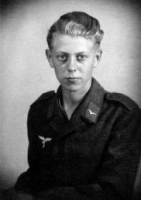
He was a student of seventeen who had been conscripted from school into the German Army in 1944. He was taken prisoner at the Battle of the Bulge. Initially shipped to the USA, he arrived in Tewkesbury on 27 February 1946 and resident in the POW camp there at Newtown.
The article is written in his own words: no translation was necessary.
Camp Newtown
Site of Camp Click Image
to Expand
to Expand
It was a cold day, that 27 February 1946, when about forty German prisoners of war, carrying their light luggage and accompanied by two British soldiers, marched from the railway station of Ashchurch to ‘Camp Newtown’ at Tewkesbury [where the Canterbury pub now is on the Ashchurch Road]. We had all come from the United States, had been disembarked in Liverpool. At Newtown four empty wooden huts were waiting for us. The camp was right on Ashchurch Road, on the eastern side was the first house of Newtown, and on the other two sides there were fields with cattle. The camp was closed in by barbed wire. Just a couple of days before Italian prisoners had left the camp for repatriation. They had left behind two black cats, a tom-cat, which mostly was ‘on the road’, and a queen, which never left the camp, loved to be cuddled and gave birth to four sweet kittens twice a year. Always in anyone’s bed! We named the two cats ‘Peter’ (German pronunciation) and ‘Alte’ (female form of ‘The Old One’). By the way, we always got rid of the kittens on farms where we had already asked permission. Before that, they were everybody’s pets and we all used to have a lot of fun with them. Two huts were ‘furnished’ with two-storey bunk beds, some stools and an iron stove, that we had to keep running on cold days. There were neither cupboards nor tables, so we tried to find boxes or something similar where we could stow our belongings. The beds had no mattresses and no sheets, but straw bags and army blankets instead. One hut was the kitchen, the canteen and the room for the two British guards, a sergeant and a private who were exchanged by others now and then. The last sergeant we had used to call me ‘Lofty’. As far as I remember they were all friendly, helpful ‘comrades’ and did not bother us. Every night after ten, one of them went through the huts and counted us. The camp was led by a German ‘Lagersprecher’ (spokesman of the camp). He was a prisoner, too, and did not have to go to work, neither did our cook. The fourth hut consisted of four rooms: (1) the washroom with water taps, washbasins and showers, (2) the latrine, (3) a store for coal with the heating stove, stoked by one of us, (4) a very small spare room, used by our medic and our barber. They had to go to work and did these occupations in the evening. There was a loudspeaker in the huts that we slept in and, late in the evening, our radio, operated by the English guards, was able to receive a German station. By listening to the reports, we learned a lot about what was happening in post-war Germany. All was quiet when the reports about the War Crime Trials in Nuremberg were transmitted.
The Food
The food was not sufficient concerning both quality and quantity. In the morning bread, tea and jam, for work two sandwiches mostly with cheese and lettuce. That was much too little for young men. When we showed those ‘hunger rations’ to our farmers – in many cases they gave us extra food. We made known the farmers’ names who gave and who did not. The reader may guess which ones we preferred to work for. Back in the camp in the evening we got a warm meal. It was poor too – but that might have depended on our cook. He was not a professional, as he was a baker. However, his Sunday cakes he made were delicious. After some time in camp, we were able to buy cake, extra cigarettes and other things delivered by the NAAFI. We ‘earned’ a shilling a day. It was a plastic chip we only could spend in camp. We also ‘earned’ a cigarette a day. As I was a non-smoker, I always exchanged my ‘fags’ for useful things. Without being previously announced, we sometimes had raids by English soldiers at night, when we were asleep. They searched the rooms, beds, our bodies, clothes and our belongings. They wanted to find things we were not allowed to possess; for example, real money. And unfortunately they found some. Often the farmer had requested us to work overtime and we were paid. That was illegal. After a year or so we got one more shilling a day, and it was a genuine coin. From then on we had no more raids.
The Clothes
POWs - Joachim tallest at backClick Image
to Expand
to Expand
When we came over from the United States, we wore used army clothing with a white ‘PW’ on the knees and on our back. By the time they wore out, we received used British army clothing with light blue patches on one knee and on the back. We had to clean and wash all our clothing by ourselves in the camp. After some time, a lot of us dyed it black or dark blue. We did it voluntarily in a very primitive way in big tins. We had to buy the dye ourselves.
The Work
We worked on farms or we dug ditches for irrigation and laid the pipes. On farms we had to do all kinds of work. We got to the workplaces on foot, by bike, by bus or by lorries. We worked in groups or single. I remember a day when I was on a one-horse cart and the horse’s bit loosened. As I pulled the reins, the whole bridle slipped off and down to the bottom of the neck. The horse was not under my control any more. It began to canter and soon to gallop from the field right into the road and bolted as fast as it could. It was a downhill road, too. I sat on the cart pulling the reins, pressing my feet against the front board, crying and frightened to death. We endangered cars and motorbikes, cyclists and pedestrians. The horse kept racing back through many curves and bends. Then it slowed down, went into its farm yard and stopped right in front of its stable – I HAD SURVIVED! In winter, when working on farms was limited, we were used for shovelling snow in town. Many a resident gave us a ‘cuppa’. As we did not want to behave impolitely, we drank every cup being offered. In the evening, we were filled up with tea and had a troubled night! Sometimes we worked with ‘land-girls’, as they were called. They wore a uniform with a badge on one sleeve with the letters WLA (Women’s Land Army). When we asked what those letters meant, they used to answer: “Winston’s Little Angels”! As they were of our age or younger, we were very interested in them, and quite a few became a ‘little angel’ for some of us. The farmers, and their workers we were with, were friendly and treated us like normal people and not as adversaries. That’s why I have only good memories of England and the English. I myself was 19 years of age when I arrived in England in 1946. I still had a baby face and did not have to shave yet. I was not ‘grown up’ in its literal meaning: when I was called to the army, I was 1.76 metres high: when I returned home I was 1.88 metres. I believe many an English mother had pity on me. I had learned English at school and soon spoke it passably. It proved to be very useful and I had quite a lot of advantages, as English speaking Germans were rather rare at that time.
The Andrews at Upper Apperley
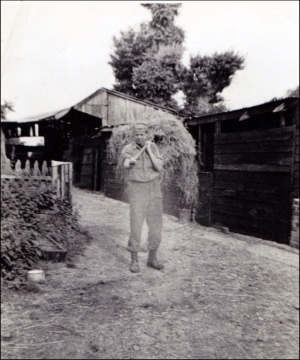
Joachim at Yew Tree Farm
After quite a while, I was sent to farmer Bill Andrews at Yew Tree Farm, Upper Apperley; and I was there on my own. The Andrews were ever so nice. All of them. On the farm lived Mr. and Mrs. Andrews, their daughter Nora, just a bit older than me, and her fiancé, and later husband, Kenneth Bainbridge. He was a few years older, and it was he whom I mostly worked with. We were like friends. I worked on that farm for fourteen months. There was another daughter, Doreen, but I hardly saw her because she had left for work when I came and returned after I had left. At lunchtime the Andrews gave me a hand basket filled with a full meal that I loved very much. I used to have it in the workshop of Chris Andrews, the farmer’s brother. My beverage was cider and, funnily, I also got cider on hot days in summer. Chris was a basket maker and had the cider mill on his estate. When the apples were ripe and picked, I helped making cider. He often was making baskets while I was eating. His dog, ‘Maxy’, kept begging. Chris used to say about his dog: “Him is a one-man dog, him is, mind”. (He pronounced ‘mind’ the Gloucestershire way.) Sometimes Chris’s wife brought me dessert. She once was a cook for Queen Mary! They had no kids and were ever so kind. He liked to joke around and we often teased each other. I also had to work with him down on the banks of the Severn where his willows grew. One day I cut the sinew of my left forefinger. Still today, the upper part of that finger can’t be stretched so I have an eternal souvenir. There was another friend of mine. Ginger, a horse, loved me! As soon as he, a gelding, saw me, he came across the field and kept me company until I gave him pieces of cow cake I had put in my pocket. One day I had forgotten to take some along, so he bit me in that part of my thigh where the pocket was. I cried with pain and soon got a black bruise for a long time. There was another horse on the farm, a mare, but she was reserved. At the cross roads in central Apperley, there lived two little girls. All the fourteen months I was there they waited in the evening until my bus or lorry passed their house and waved. Whenever I passed their house, they rushed out to say “Hello, Yockim”. They were 14 and 16 years of age as far as I can remember. Sometimes I had a short talk with them. I believe they will have missed me when I, all of a sudden, did not come any more. In 1966 Nora told me that I had “broken their hearts”! Up to now, I have been to England several times. In 1966 I visited the Andrews: all of them were still alive and the family had grown by two grandchildren. Only Chris and his wife were dead. When I returned there in 2009 only Nora and Ken were alive.
The Packwoods at Tewkesbury
The baker, who delivered bread, cake and pastries, asked me one day “can you swim?” That question was the beginning of an everlasting friendship. I remember that I was just coming up the back garden on Andrews’ farm. As I answered in the affirmative, he invited me to Sunday lunch in his house. His name was George Packwood. His family consisted of George, his wife Violet and the two sons Peter and Roger. Peter was not much younger than me; Roger was 10, a very vivacious and always cheerful chatterbox. I regularly came to the Packwoods every Sunday, had a delicious meal with them – Vi was an extraordinarily good cook – and stayed until evening. Swimming? We did that only once. Was it in the Severn or in the Avon? I don’t know any more. A few times I went with George to his allotment and helped in the garden. On the way back, we stopped at a pub. He went in and had his pint: I waited outside and he brought one out to me. Pubs were places German prisoners were not permitted in up to the very end. When I was back home, we kept corresponding until the end of their lives. I visited them twice, in 1964 and in 1966. In 2009 I was in England again. Nigel, Roger’s son, came to Bath, with his car, and picked me up. At Tewkesbury, we picked Peter up. The three of us had supper at Newtown in the public house, The Canterbury. That is right on the site of my former prison camp! Afterwards we went to see Roger at Tewkesbury and Ken and Nora at Upper Apperley. In 2010 Peter, Roger and Nigel came over to my place Braunschweig (English ‘Brunswick’) for a couple of days. In our programme, there was a day trip to Berlin. I still keep in touch with Nigel by e-mail.
Re-education
This is the term for the Allied Forces’ measures in Germany to help the people establishing a democracy. Those measures were not applied to us. However, I believe that the relief we received step by step was the way we were ‘re-educated’. The first step was writing letters and receiving them. Then they tore down the barbed wire and replaced it by a simple fence. After that, we were allowed to go to services. The Catholic Church was the first. We all went there: both Catholics and Protestants. After that we asked the Protestant church for the parson to come into our camp and conduct a service in German! We asked him to open up his church for us to attend the regular service. He did, and so we were able to go to services in the famous Tewkesbury Abbey. At Christmas 1947, we were allowed to be invited by English families. Those who had to go by bus or by train got the tickets from the army. I spent that Christmas with the Andrews at Apperley. Finally I and many others felt at home in England – and as free as the English.
Repatriation
As far as I can remember, it was spring 1947 when German immigrants came into Newtown Camp and investigated each of us about his past and his opinion about Nazism. As a result, we were classified into three grades: ‘A’ were the ‘democrats’ and ‘C’ the ‘ardent Nazis’. There were not many in these two groups: the majority got a ‘B’. I think they were called the ‘indifferents’, but I’m not sure. I tried to get an ‘A’ because, on 27 December 1944 during the Battle of the Bulge, I had deserted to the American Army. The reason for this was that I had been an eyewitness of a war crime, committed by German soldiers in The Hague on 21 November 1944. However, my investigator did not believe me; he accused me of having invented the “fairy story”, as he called it. He said that I had been in the Hitler Youth and had gone to a school in Nazi-Germany, and so I had been indoctrinated. Unfortunately I had no right to object to the judgment. I was very disappointed, because I was longing to get home early. I did not have a profession because I had been conscripted to the German army when I still was a grammar schoolboy. The repatriations started in summer 1947. Soon the camps began to empty. One satellite camp after the other was closed. The prisoners were taken to the main camp. The occasion to close Newtown came with the great flood, when the water reached the camp. It was 20 March 1947, when we all were taken to our main camp, Sudeley Castle at Winchcombe. Because of the repatriations the camp kept emptying: one day, we were so few that I was appointed interpreter. On the last time I was with him, a local man gave me ten pounds as a farewell present. Then I did not go to work anymore: I was sitting in the office, chatting with the German staff – simply lazing about! The camp was closed down on 20 January 1948. We were taken to Leckhampton Court near Cheltenham. My next stations in England were in Bristol (24 February), including a very short stay working at a satellite camp named Sunnyside (I have forgotten most of the names) and eventually Bury St. Edmunds (7 May). We embarked in Harwich on 13 May 1948: this time with heavy luggage. When our ship was leaving, I went to the railing and kept looking at England until it disappeared out of sight. As I was looking forward to seeing father and mother after almost four years, I would not say that I was sad. However, I remained still and thought back to my period of life in ‘merry old England’ where I had encountered so many kind people and where I had left friends behind. When I was at home and listened to the experiences of those who had been prisoners in other countries, I realized: I was not far away from having been a “Guest of HM Government”.
Joachim’s postscript:
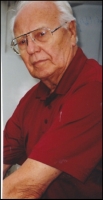
Joachim in 2011
After I returned home, I went to a teachers training college, and I was a teacher in East Germany until 1955. I left there because I was fed up with another dictatorship. Since my stay in England I wanted to live in a democracy. In West Germany I started with a study again to achieve a higher grade. My wife was also a teacher; I retired in 1989. We have two sons: one is a vocational school teacher here in Braunschweig and the other is a surgeon in Berlin. I have four grandchildren – two sets of twins! – all 12 years old.
Joachim Schulze passed away in 2013 aged 86.
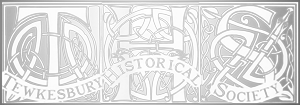
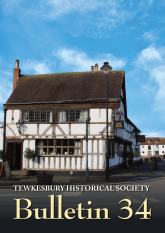
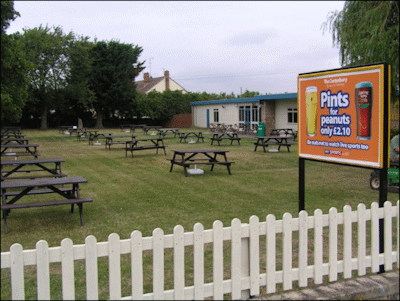
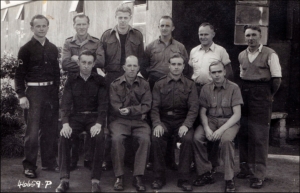
Comments
Tuesday 13-Aug-2024 by: Michael Condon
I spent a fair amount of time in Tewkesbury in my early childhood. I was born in the Black Country in 1937. My mother's sister, Aunty Win, and her family lived in Abbey Road, just over the playing fields from the Abbey. Uncle Sid was a train driver, based in Ashchurch. My young brother was born in Tewkesbury in 1941, as my parents thought it wise that my pregnant mother and I should escape the Blitz that nightly involved heavy bombing raids on the industrial Midlands.
I enjoyed reading Joachim’s sympathetic account of his time as a POW (Prisoner of War) in Tewkesbury. I recall the American soldiers who were based near Ashchurch during the War. Indeed, my cousin, Mavis, married one of them and became a GI bride, emigrating to the US, to be followed a year or two later by my Aunt, Uncle and cousin, Roger. I do not remember the Tewkesbury POWs who arrived later in the War.
Back at home, by coincidence, I also came into contact with German POWs. My recently built Catholic Parish Primary School was situated on the main Birmingham-Wolverhampton Road. In the heavy winter of 1947, POWs cleared the ice and snow drifts from the main road. Their camp was about two miles away, so they used the school kitchens to prepare their snacks, coffee and lunch. At first, we were told not to bother them but we children were fascinated by them and they, in turn, were a happy and cheerful group who liked the refreshing company of young, curious and talkative children. I particularly enjoyed chatting with a very genial young POW named Hans, whom I remember as the group leader. He spoke good English which eased communication with us ‘green’ youngsters. We probably reminded them of their own young families at home in Germany.